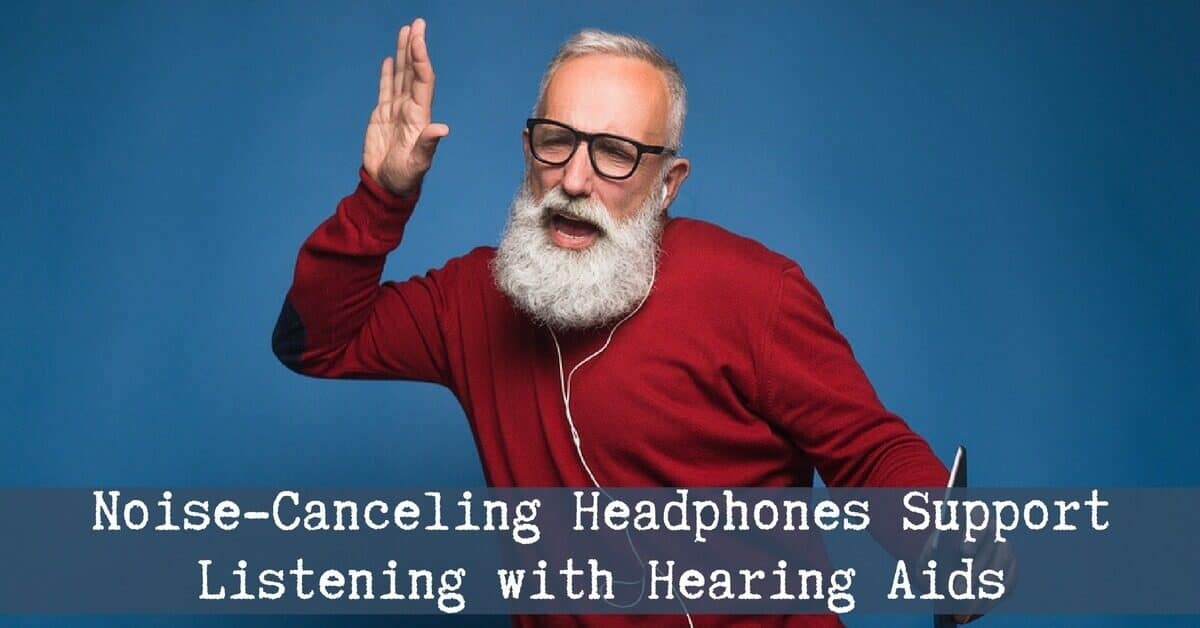
Do you love listening to music but find it almost impossible in places with a lot of background noise? Has your sensitivity to loud noises become more pronounced as your hearing loss gets worse? Noise-canceling headphones can protect your ears by removing distracting and harmful background sounds, and can also support listening with hearing aids, so you’ll be able to hear clearly.
Background Sounds Can Be Harmful
You may not notice it all the time, but the background sounds you’re exposed to every day can be doing a lot of harm. Have you been on an airplane recently? Did you know that the engine noise within the plane can reach up to 90 decibels? Or take an example closer to home. At sports events or loud concerts, decibel levels from the stage and from the audience can be deafening. Literally.
Sounds are considered harmful once they reach over 85 decibels, and prolonged exposure to these sounds will lead to permanent hearing loss. The louder the sound the less time it takes to damage your hearing, and some sounds are so loud it will only take a few seconds to do some serious damage to the delicate cells of the inner ear. While it’s easy to tune out the hum of an engine, or the traffic noise on your daily commute, this repeated exposure to loud background sounds damages your hearing.
What Are Noise-Canceling Headphones?
If you have hearing loss, being exposed to loud noises even for a few hours can cause discomfort or pain, and could lead to tinnitus, vertigo, or even a temporary muffling of sounds. Noise-canceling headphones could be your solution to protecting your hearing on your daily commute or your next vacation.
Noise-canceling headphones are designed to block as much external sound as possible. Headphones do a better job at blocking sounds than earbuds, and all headphones, even regular ones, block some of the sound around you by creating a seal around the ears. This physical barrier shields your ears from surrounding sounds, and high-quality headphones with a great seal can lower external sounds by up to 20 decibels.
But noise-canceling headphones do much more than that. When you activate your headphones, electronics embedded in the headphones monitor the sounds around you and create wave lengths that cancels out all that background noise. This technology can reduce sounds by 80 decibels! That’s roughly the sound of heavy traffic or a powerful food blender. You’ll be able to listen to music or programs in peace, without having to crank up the volume to unsafe levels. Your favorite tunes have never sounded better, and you won’t be damaging your hearing.
How Noise-Canceling Headphones Support Listening
Headphones can easily be worn with hearing aids, and the best styles to wear under headphones are in-the-ear, in-the-canal, and completely-in-the-canal. These all sit within the ear itself and will allow the headphones to create a good seal around your ears.
Once you have a quality pair of noise-canceling headphones, you’ll discover a few more uses for your new technology. They’re great when it comes to enjoying music on your commute, but you can also put on your headphones and activate the noise-canceling feature without turning on any music. You’ll find that wearing these headphones will block uncomfortable background noises and protect your ears. At the movie theatre, for example, loud scenes involving gunfire it can be so loud it hurts. Your headphones will block these loud sounds, protecting your hearing and making it easier to follow the plotline. Combine this with captions, and you’ll find you enjoy movies again. If you’re at a ball game with your family, you can simply use the headphones to block the dangerously loud sounds and enjoy your afternoon without worrying about the painful ringing in your ears.
Visit Us for the Best in Hearing Technology
Noise-canceling headphones to support listening might seem like a crazy idea, but you’ll be amazed at the difference it makes. You’ll protect your ears from noise and will be able to hear the sounds you want to hear. They’re available at many electronics stores. If you want more advice on which headphones will work with your current hearing aids, or you’re ready to get your first hearing device, visit us at My Hearing Centers.
